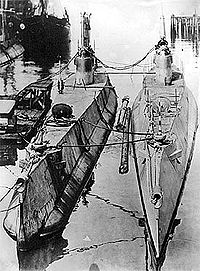CC-class submarine

HMCS CC-1 and HMCS CC-2
|
|
| Class overview | |
|---|---|
| Name: | CC class |
| Builders: | Seattle Construction and Drydock Company |
| Operators: |
|
| Preceded by: | None |
| Succeeded by: | H class |
| Built: | 1913 |
| In commission: | 1914–1920 |
| Completed: | 2 |
| Retired: | 2 |
| General characteristics | |
| Type: | Submarine |
| Displacement: |
|
| Length: | 144 ft (44 m) |
| Beam: | 15 ft (4.6 m) |
| Draught: | 11 ft (3.4 m) |
| Propulsion: | MAN 6-cylinder diesel engine |
| Speed: | 13 knots (24 km/h; 15 mph) |
| Test depth: | 200 ft (61 m) |
| Complement: | 18 (2 officers, 16 enlisted) |
| Armament: | 5 × 18 in (457 mm) torpedo tubes |
The CC-class submarine was the first class of submarines used by the Royal Canadian Navy. Designed as diesel-electric submarines for use as coastal defence, they were originally purchased by the province of British Columbia from a shipbuilder in Seattle, Washington, which had built the submarines for the Chilean Navy. Acquired by Canada they saw no battle while in service during the First World War and were paid off in 1920. They were the first Canadian warships to pass through the Panama Canal. Both ships were discarded in 1925.
The two submarines were not identical. The design called for diesel-electric submarines for use as coastal defence. However, the Electric Boat Company employed two separate designs with the same internal machinery for the submarines. CC-1 was built to the design 19E and CC-2 was built to design 19B. The layout of the torpedo tubes within the boats led to different hull forms. CC-1 was armed with five 18 in (460 mm) torpedo tubes, four forward and one astern. This gave the submarine a bluff bow shape.CC-2 was armed with three torpedo tubes of the same size, two forward and one astern. This gave CC-2 a tapered bow. Both ships used Whitehead Mk IV 18-inch (460 mm) torpedoes that had a range of 1,000 yd (910 m) at 25 kn (46 km/h; 29 mph). The only source for these torpedoes in Canada was HMCS Niobe's stock and it took some time before they were shipped to the submarines.
Due to their different designs, the two submarines had different measurements.CC-1 displaced 313 tons and had a length of 144.5 ft (44.0 m), a beam of 15 ft (4.6 m) and a draught of 11 ft (3.4 m). CC-2 displaced 310 tons, had a length of 157.5 ft (48.0 m), a beam of 15 ft (4.6 m) and a draught of 11 ft (3.4 m).
...
Wikipedia
